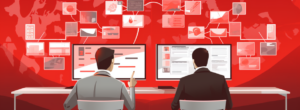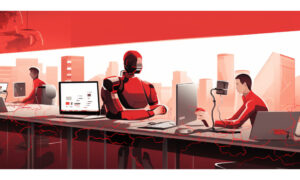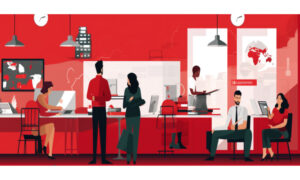Put performance development into your employees' hands: Roly Walter, Founder, Appraisd
- 6 Min Read
In this installment of our HRD Tech Founders Q&A series, Roly Walter, Founder, Appraisd, makes the case for letting your employees take control of their performance development, and reveals how doing so can transform the employee experience and provide crucial insights for HR and the wider business.
- Author: Michael Hocking
- Date published: Nov 6, 2019
- Categories

What is the true potential of HR and how can technology help us to achieve it?
In this installment of our HRD Tech Founders Q&A series, Roly Walter, Founder, Appraisd, makes the case for letting your employees take control of their performance development, and reveals how doing so can transform the employee experience and provide crucial insights for HR and the wider business.
What is Appraisd?

Appraisd is a unique performance development system designed to let employees take control of their feedback, check-ins and goals. While simple for managers and their teams to get to grips with, it also reveals powerful insights for HR and the wider organisation. We know that every company is on their own journey to create their distinctive culture which is why Appraisd has been designed to flex and evolve as they do.
Why was it necessary to create Appraisd?
I started building Appraisd back in 2012. From my own experience working as an HR business analyst at Goldman Sachs, I saw first-hand how the annual appraisal process wasn’t working for the company or their employees. It was a tick box exercise that we all had to endure, adding very little value. I wanted to create something that would help employees and companies get more out of reviews and take away the pain of mounds of paperwork left until the end of the year. It was clear that moving to a little and often approach, supported by a simple online system was the way forward.
It was also around the time when consumer apps were developing rapidly, and I wanted to transfer that same fantastic user experience to workplace tools. From the humble surroundings of my garden shed I made the core prototype. Over the last seven years, Appraisd has evolved and developed into one of the leading platforms in this area, used by almost 300 companies and tens of thousands of employees across the world. And we’ve moved out of the shed!
Why is HR technology crucial to the success of a business?
Despite a huge boom in HR technology in the past decade, I still believe there are untapped opportunities for many organisations in this field. We are still getting to grips with how the mind works, how habits are formed and how technology influences us. Consumer apps have completely altered human behaviour – just think how text messaging, Uber and Spotify have changed our attitudes to being prompt for meetings, to using public transport and to dwelling on a musical artists carefully constructed album. There’s still a huge way to go with HR apps and human behaviour at work, and this is the area that interests me the most.
Line managers in particular are under huge pressure to spend quality time both on talking to clients and providing services as well as managing their teams – it’s unsurprising that time spent coaching their team members is often at the bottom of the priority list until it’s too late. At Appraisd we think appropriate use of technology can create the right patterns of behaviour in managers to engage, develop and get the most out of their people. Being able to update objectives, check in on career paths or be alerted on engagement levels at any time is now considered essential for successful enterprise in our knowledge economy.
How can an organisation most effectively implement new HR technology?
Even the most revolutionary technology is only effective if people see how it benefits them, understand it and ultimately use it. It’s essential that the technology on offer is clear, simple and easy to use – that’s has always been the guiding principle for Appraisd. Above all else the user experience must be a positive one and anyone should be able to very quickly pick up how to use it without training.
Secondly the communication around the new technology must very clear. Employees must understand quickly why it’s being introduced and how it will benefit them. Think about all the channels that are available to you and how you can use them creatively. Draw on in-house expertise from the marketing or internal communications team to come up with a campaign that will grab attention. In our experience, the hands-on approach works really well: giving employees the chance to explore the technology for themselves and asks questions helps to generate a much higher level of engagement from the outset. So, set up a market stall in the foyer and get to work!
What do you think is the biggest challenge affecting organisations today?
Huge political issues like Brexit and climate change will undoubtedly have an impact on businesses; at this stage it is very unclear just how large that will be. One thing that organisations need to do is not become paralysed by this outside uncertainty and continue to invest in their employees’ development, the lifeblood of any company. Businesses need to concentrate on the elements that they can control, focusing on building a flexible workforce that is primed to take advantage of whatever happens in the wider world.
Employees increasingly want to work for organisations that have a clear purpose and are committed to giving back to their local community. If there is to be real progress on tackling climate change, then organisations will need to be at the forefront of this movement. Businesses will be challenged more and more – by employees as much as customers – to show their environmental credentials and how they are looking to reduce their carbon footprint. I predict a rise in the number of B Corp organisations that balance purpose with profit, and I can see these becoming the employers of choice, particularly for Generation Z.
Which emerging technologies do you think will transform HR in the future?
We have seen the trend for technologies developed in the outside world being adopted within a business context and I can see that continuing. Almost 10 million homes in the UK now have a smart speaker and I can see this technology moving into offices in the new feature. You can immediately see how it could help speed up tasks, like quickly accessing documents. There would be definite advantages in our field of performance development, and it is something I’d be very interested in exploring.
There has been a rapid development in technology over the past few years and in HR tech has been an area at the forefront of this expansion. New products and start-ups are appearing daily and the vast choice is bewildering for many organisations. With so many different options, businesses often find it hard to identity what they really need, and I believe many have fallen into the trap of buying technology for the wrong reasons, such as a desire for the latest gadget or simply to copy competitors. I think the future is not so much about emerging technologies but enhancing existing systems. Incorporating new features that nudge employees to affect behaviour change and using psychological insights to develop them to make the user experience feel easier and more natural can make an enormous difference to their effectiveness.









